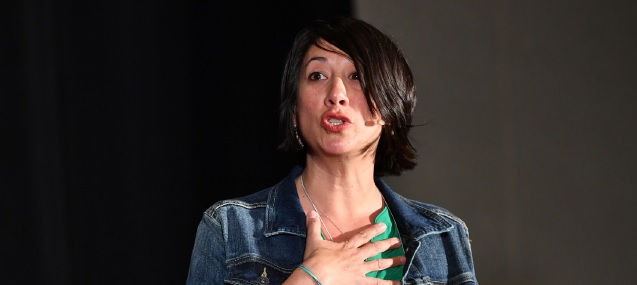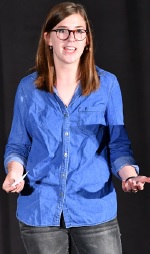
Jenny Castro’s presentation titled, “What I told my daughter,” was part of Wednesday’s MennoTalk panel at #MennoCon17. Photo by Kenneth Krehbiel.
by Erin Bradley for Mennonite Church USA
Wednesday kicked off the first convention MennoTalk with a panel of five who paid tribute to 100 years of Mennonite women in the church.
The five women discussed past personal and female accomplishments, struggles and celebrations.
Alma Ovalle, who serves on the board of Mennonite Women USA, and Sarah Ann Bixler, coordinator of adult worship, spoke on women’s influence both on the conference and on others’ individual formation. Ovalle discussed the Conferencia Femenil Hispana Menonita and the women who created the influential conference, quoting the conference founder:
“We wanted to gather, to have a group of our own. Most were pastor’s wives and women in the church. And they wanted to get together to be with each other.”
Despite a lack of leadership roles for women, Bixler said women have always found subversive ways to enact power.
“Let us continue to bring our authentic selves to this work,” Bixler said. “May we not assume hegemonic, masculine approaches to leadership, but may we lead boldly and with compassionate authority.”
Jenny Castro, coordinator of Mennonite Church USA’s Women in Leadership Project, kicked off talking about oppression and issues facing women; in the church and broader community. “Girls and women move about in the world under incredible pressure to fill blatantly unrealistic ideals,” she said. Castro’s call to action was to be diligent in our actions and to not hide our potential, but to embrace ourselves and our faith and be change agents.
“It matters,” Castro said. “It matters what we do in our real-life relationships and in our spheres of influence. Our behaviors matter.”
“We have to be aware of the messages we are communicating. When we compliment a girl on how cute she looks after she nailed the science project presentation, or when we ask a young women to tone it down in her presentation to the board … We have to be aware of what we are communicating,” she continued.
Along the same vein, Abby King, a sophomore at Goshen College, reflected on her own struggles with self-love.
On one presentation slide, King asked, “How could I be 7 years old and already hate my body?”She worked to reclaim words used to tear her down, found feminism and learned you must love yourself before you can love others.

Abby King explores self-love in her MennoTalk on Wednesday in Orlando. Photo by Kenneth Krehbiel.
“Once I realized ‘bossy’ is just a word people used to make women quiet, the word shriveled up and disappeared,” King said.
“When you think of all the negative words you use to describe yourself, take a moment and figure out if you actually feel that way or whether society is telling you to feel that way.”
Hannah Heinzekehr, the editor of The Mennonite, spoke about microaggressions alive today in the Mennonite Church. She cited situations like letters to the editor diminishing minority writers, objectifying comments on a presenter’s appearance, and a Mennonite leader who thanked a pregnant board member for “continuing to populate the Mennonite Church.”
“The truth is the systems of oppression aren’t just maintained by blatant hate-filled acts.” Heinzekehr said. “They are propped up by micro aggressions like these often perpetrated by well-intentioned people and our unwillingness to name them for what they are.”
While some topics edged on serious topics, each speaker ended with an action for a hopeful future. They encouraged participants to speak truth into their daily life and self-images, point out injustices and propel women and the conference forward.
“May we have the courage to do this hard and countercultural work,” Castro said. “Not only for ourselves, because that’s not enough.”
Read the full issue of the Orlando Squeeze here.

